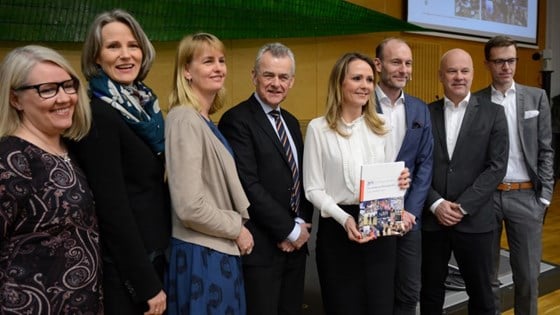Media Pluralism Commission delivers its report, Norwegian media pluralism - A stronger media policy for the public
Historical archive
Published under: Solberg's Government
Publisher: Ministry of Culture
Press release | No: 10/17 | Date: 07/03/2017 | Last updated: 09/03/2017
Today, Minister of Culture Linda Hofstad Helleland was presented the Official Norwegian Report (NOU) 2017:7, Norwegian media pluralism - A stronger media policy for the public, by Knut Olav Åmås, chair of the Media Pluralism Commission.

English Summary of Norwegian media pluralism - A stronger media policy for the public (.pdf)
The commission’s report and full list of proposals. (Norwegian only)
“The commission is asking Norwegian politicians to revise current media policy and adopt more ambitious objectives for public schemes as soon as possible, and much more quickly than before. A rapid response is required,” says commission chair Knut Olav Åmås.
“I would like to thank the Media Pluralism Commission for the thorough job it has done,” says Minister of Culture Linda Hofstad Helleland.
“The commission points out that developments are faster-paced than ever before, and that effective measures are urgently required. At the same time, we have to ensure a thorough process before we implement new measures. We need a broad consultation and a robust political process when working towards a comprehensive review of the current media policy,” says Helleland.
The commission has unanimously proposed various changes to current media policy instruments, and put forward various new measures. Most of the measures apply for an initial four-year period, and the commission has emphasised the need to evaluate the measures before deciding if they should be continued.
Calculations show that the proposed changes and new measures will cost between NOK 743 million and NOK 843 million per year, including compensation for a commercial public service broadcaster. The commission has based its comprehensive proposals on the importance of safeguarding access to important journalistic output at a time of significant turbulence and change in the media sector.
The most important proposals are:
- Expansion of the value added tax exemption to include all news and current affairs media and the sale of individual news articles.
- A time-limited exemption from employer’s national insurance contributions for news-focused Norwegian media companies.
- Retention of production grants for news media, albeit with several adjustments:
- Local media receive a minimum grant of NOK 750,000 (NOK 1,295,000 for newspapers in northern Norway).
- The grant rate for "number two newspapers" in cities (not the national, opinion-forming newspapers) will be replaced by the rate for local number two media. The change will be phased in over four years.
- The grant ceiling will be reduced to 27 per cent of a recipient’s operating costs. The change will be phased in over four years.
- The commission has proposed three new grant schemes:
- A grant scheme to support news media innovation projects – NOK 30 million per year.
- A grant scheme to promote journalism of societal importance – NOK 20 million per year.
- A grant scheme for news media that are free for users – NOK 20 million per year.
The Media Pluralism Commission submitted an initial report on commercial broadcasting in October 2016. The commission concluded that, if the State still desires a commercial public service broadcaster based outside Oslo, there is a need for new instruments. As a matter of principle, the commission has also proposed transfer of the State’s ownership of the Norwegian Broadcasting Corporation (NRK) to a foundation.
The Norwegian Government appointed the Media Pluralism Commission in September 2015, with a mandate to evaluate what the State’s media pluralism objectives should be and to examine the totality of Norwegian media output by reference to key developments. Based on this analysis, the commission was asked to make proposals as to the focus of State fiscal policy instruments in order to promote open, informed public debate and diverse media output.